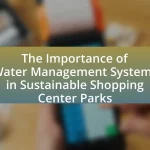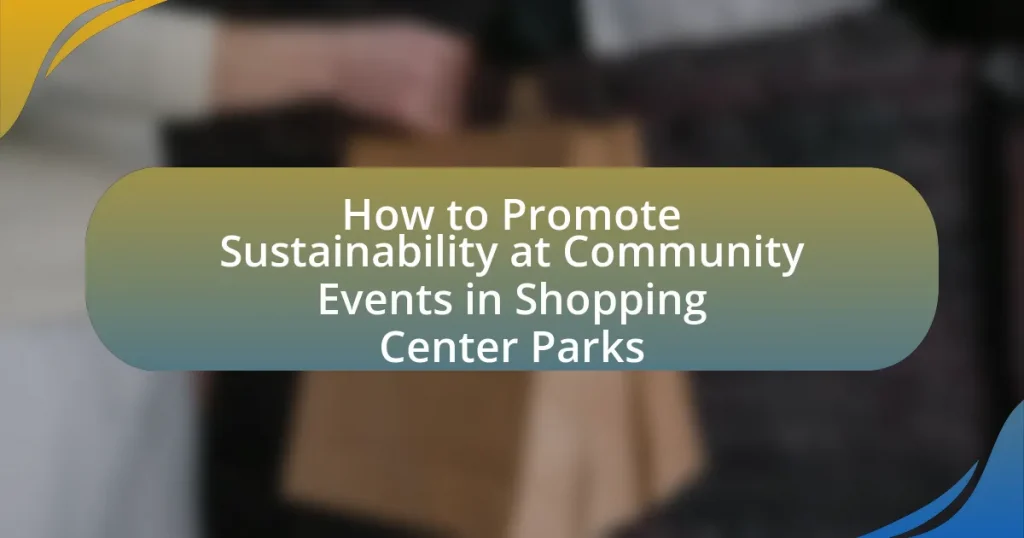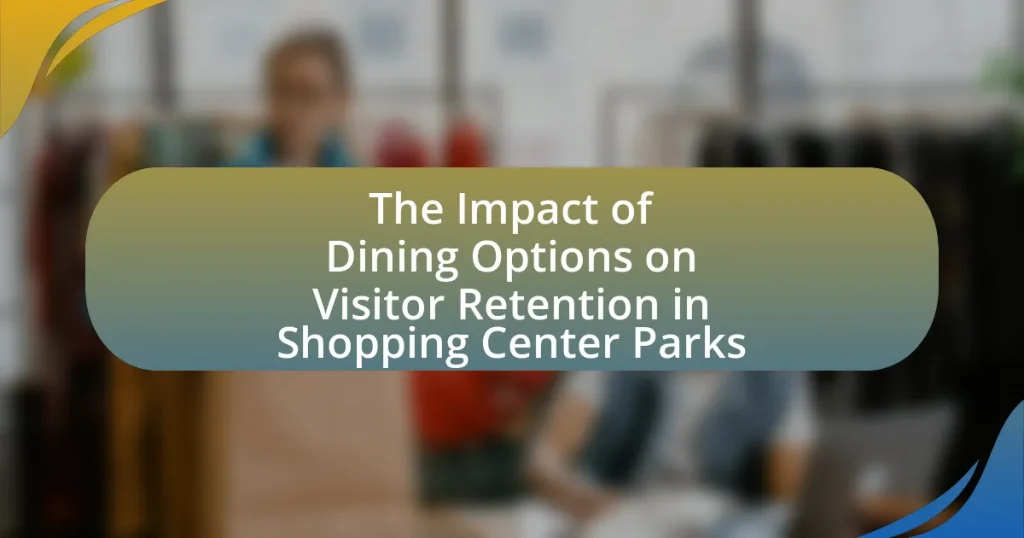The article focuses on promoting sustainability at community events held in shopping center parks, emphasizing the importance of minimizing environmental impact, fostering social equity, and ensuring economic viability. Key principles of sustainability, such as environmental stewardship and community engagement, are explored, along with practical strategies for event organizers, including waste management, local sourcing, and educational initiatives. The role of local communities and partnerships with various organizations in enhancing sustainability efforts is highlighted, alongside successful case studies that demonstrate the benefits of implementing sustainable practices in these settings.
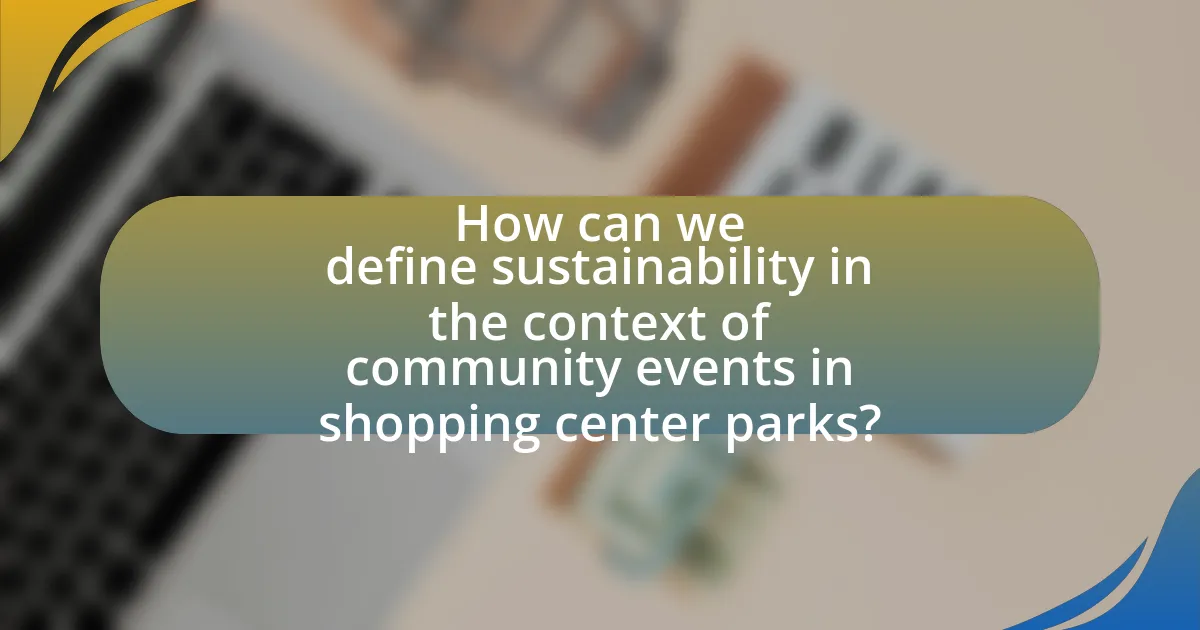
How can we define sustainability in the context of community events in shopping center parks?
Sustainability in the context of community events in shopping center parks can be defined as the practice of organizing and conducting events that minimize environmental impact, promote social equity, and support economic viability. This includes using eco-friendly materials, reducing waste through recycling and composting, and ensuring accessibility for all community members. For instance, events that incorporate local vendors not only reduce transportation emissions but also stimulate the local economy, demonstrating a commitment to sustainable practices.
What are the key principles of sustainability relevant to community events?
The key principles of sustainability relevant to community events include environmental stewardship, social equity, and economic viability. Environmental stewardship emphasizes minimizing waste, reducing carbon footprints, and utilizing renewable resources during events. Social equity focuses on inclusivity, ensuring that all community members can participate and benefit from the event. Economic viability involves creating events that are financially sustainable, supporting local businesses, and fostering long-term community development. These principles guide the planning and execution of community events to ensure they are beneficial for the environment, society, and the economy.
How do these principles apply specifically to shopping center parks?
The principles of sustainability apply to shopping center parks by emphasizing eco-friendly practices, community engagement, and resource efficiency. Shopping center parks can implement green infrastructure, such as rain gardens and permeable pavements, to manage stormwater and reduce urban heat. Additionally, these parks can host community events that promote local businesses and sustainable products, fostering a sense of community while encouraging environmentally responsible consumer behavior. Evidence shows that integrating sustainability into shopping center parks not only enhances the visitor experience but also increases foot traffic and sales, as consumers increasingly prefer businesses that demonstrate environmental responsibility.
What role do local communities play in promoting sustainability?
Local communities play a crucial role in promoting sustainability by actively engaging in environmentally friendly practices and initiatives. They contribute to sustainability through community-led projects such as recycling programs, community gardens, and local clean-up events, which foster a sense of responsibility and stewardship for the environment. For instance, a study by the United Nations Environment Programme highlights that community involvement in sustainability initiatives can lead to a 30% increase in recycling rates and a significant reduction in waste generation. This demonstrates that local communities not only implement sustainable practices but also influence broader environmental policies and behaviors through grassroots activism and education.
Why is promoting sustainability important for community events?
Promoting sustainability is important for community events because it fosters environmental responsibility and enhances community engagement. Sustainable practices reduce waste, conserve resources, and minimize the ecological footprint of events, which is crucial given that events can generate significant amounts of trash and carbon emissions. For instance, a study by the Green Events Initiative found that large events can produce up to 1,000 tons of waste, highlighting the need for sustainable management. By implementing recycling programs, using eco-friendly materials, and encouraging public transportation, community events can serve as models for sustainable living, inspiring attendees to adopt similar practices in their daily lives.
What environmental benefits can arise from sustainable community events?
Sustainable community events can significantly reduce environmental impact by minimizing waste, conserving resources, and promoting biodiversity. These events often implement practices such as using biodegradable materials, which decreases landfill contributions and pollution. For instance, a study by the University of California found that events utilizing compostable products reduced waste by up to 50%. Additionally, sustainable events often incorporate local food sourcing, which lowers carbon emissions associated with transportation and supports local agriculture. Furthermore, these gatherings can enhance community awareness about environmental issues, leading to long-term behavioral changes that benefit the ecosystem.
How does sustainability enhance community engagement and participation?
Sustainability enhances community engagement and participation by fostering a sense of shared responsibility and collective action among community members. When sustainability initiatives are implemented, they often involve local residents in decision-making processes, encouraging them to contribute ideas and solutions that address environmental concerns. For instance, community gardens and recycling programs not only promote eco-friendly practices but also create opportunities for residents to collaborate, share knowledge, and build relationships. Research indicates that communities engaged in sustainability efforts report higher levels of social cohesion and participation in local events, as seen in studies conducted by the University of California, which found that neighborhoods with active sustainability programs experienced a 30% increase in community event participation.
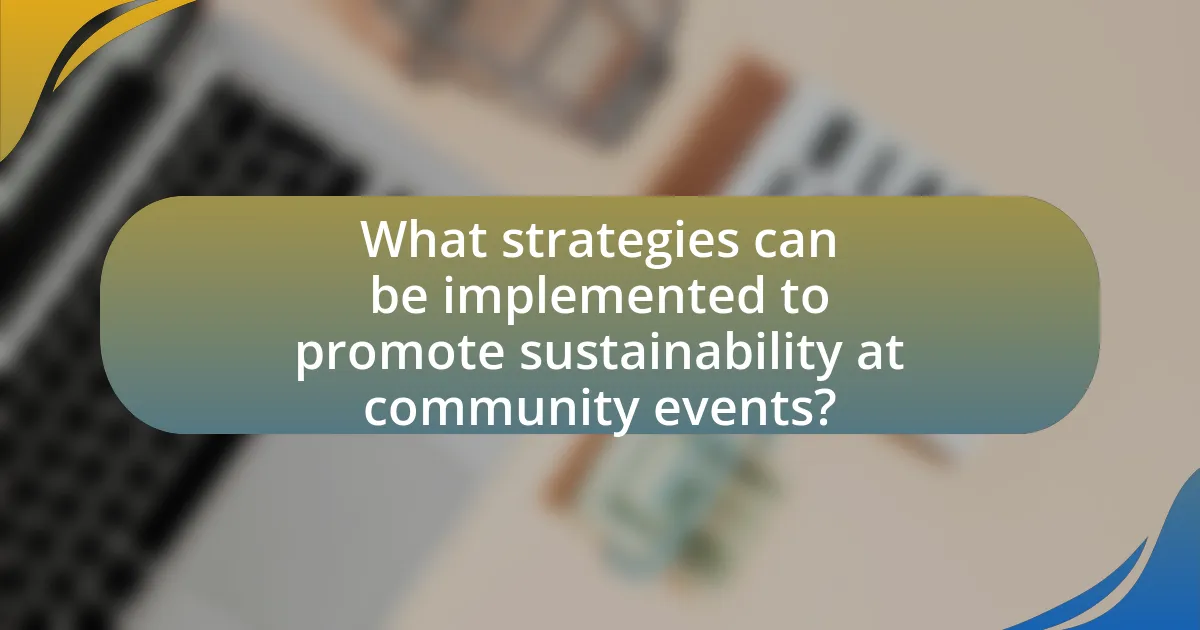
What strategies can be implemented to promote sustainability at community events?
To promote sustainability at community events, organizers can implement strategies such as utilizing eco-friendly materials, encouraging waste reduction, and promoting local food sourcing. Eco-friendly materials, such as biodegradable utensils and recyclable signage, minimize environmental impact. Encouraging waste reduction through initiatives like recycling stations and composting can significantly decrease landfill contributions; for instance, events that adopt these practices have reported up to a 50% reduction in waste. Additionally, sourcing food from local vendors not only supports the community economy but also reduces carbon emissions associated with transportation. These strategies collectively enhance the sustainability of community events.
How can event organizers incorporate sustainable practices into planning?
Event organizers can incorporate sustainable practices into planning by prioritizing eco-friendly materials, reducing waste, and promoting local resources. Utilizing biodegradable or recyclable materials for event signage, utensils, and decorations minimizes environmental impact. Implementing a waste management system that includes recycling and composting stations encourages attendees to dispose of waste responsibly. Additionally, sourcing food and supplies from local vendors reduces transportation emissions and supports the community. According to a study by the Green Events and Innovations Conference, events that adopt sustainable practices can reduce their carbon footprint by up to 50%.
What are effective waste management strategies for community events?
Effective waste management strategies for community events include implementing recycling and composting programs, providing clearly labeled waste bins, and conducting waste audits. Recycling and composting programs help divert waste from landfills, with studies showing that events can reduce waste by up to 50% when these practices are in place. Clearly labeled waste bins encourage proper disposal, as research indicates that confusion about waste separation leads to contamination and increased landfill waste. Conducting waste audits before and after events allows organizers to assess waste generation and identify areas for improvement, leading to more efficient waste management in future events.
How can local vendors contribute to sustainability efforts?
Local vendors can contribute to sustainability efforts by sourcing products locally, reducing transportation emissions and supporting the local economy. By prioritizing local ingredients and materials, vendors minimize their carbon footprint and promote sustainable agricultural practices. For instance, studies show that food miles can significantly impact greenhouse gas emissions; sourcing locally can reduce these miles by up to 90%. Additionally, local vendors often engage in environmentally friendly practices, such as using biodegradable packaging and implementing waste reduction strategies, which further enhances their sustainability impact.
What role does education play in promoting sustainability at events?
Education plays a crucial role in promoting sustainability at events by informing attendees about sustainable practices and their environmental impact. Through workshops, presentations, and informational materials, education empowers participants to make informed choices regarding waste management, resource conservation, and eco-friendly behaviors. For instance, events that incorporate educational components, such as recycling demonstrations or discussions on sustainable sourcing, can lead to a measurable increase in recycling rates and reduced waste generation. Research indicates that events with educational initiatives can enhance participant engagement and foster a culture of sustainability, ultimately leading to long-term behavioral changes that benefit the environment.
How can workshops and informational booths enhance awareness?
Workshops and informational booths enhance awareness by providing interactive and engaging platforms for education on sustainability practices. These settings allow participants to gain hands-on experience and direct access to information, which increases retention and understanding of sustainable behaviors. Research indicates that experiential learning, such as that found in workshops, significantly improves knowledge retention compared to traditional methods; for instance, a study published in the Journal of Environmental Education Research found that participants in interactive workshops demonstrated a 30% increase in knowledge retention over those who received information through lectures alone. Additionally, informational booths can serve as focal points for community engagement, facilitating discussions and networking opportunities that further disseminate sustainability messages.
What materials can be used to educate attendees about sustainability?
Printed brochures and informational pamphlets can be used to educate attendees about sustainability. These materials can provide concise information on sustainable practices, local environmental initiatives, and tips for reducing waste. Research indicates that visual aids, such as infographics, enhance understanding and retention of sustainability concepts, making them effective educational tools. Additionally, interactive displays and workshops can engage attendees, allowing them to learn through hands-on experiences, which has been shown to increase knowledge retention by up to 75%.
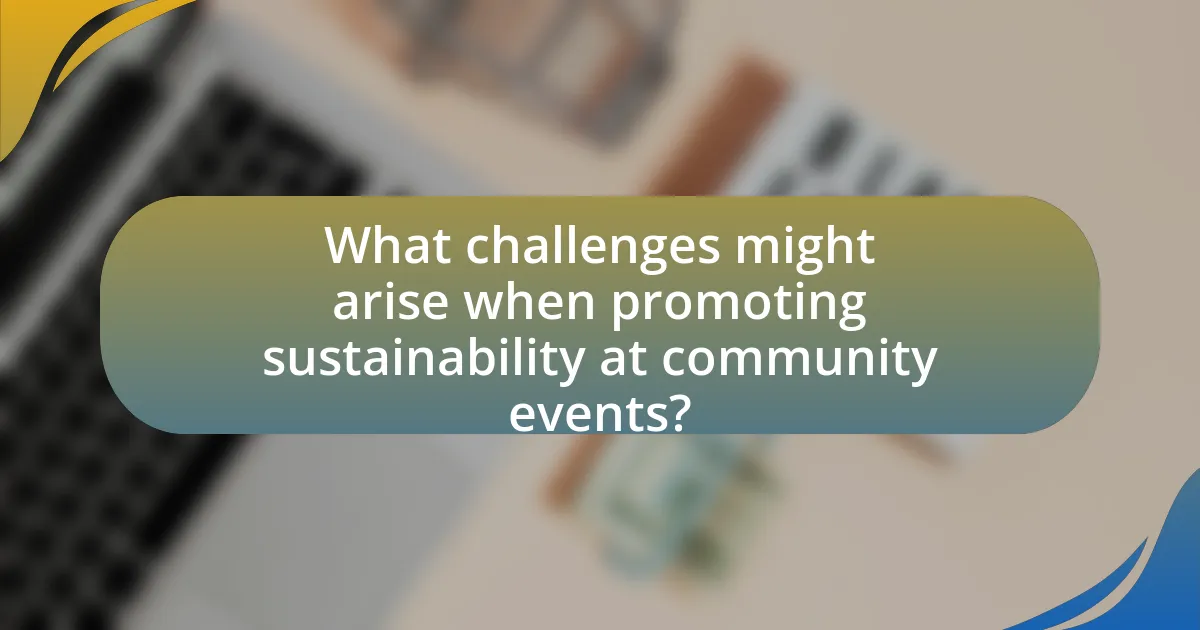
What challenges might arise when promoting sustainability at community events?
Promoting sustainability at community events can face challenges such as limited funding, lack of community engagement, and insufficient infrastructure. Limited funding restricts the ability to implement sustainable practices, as many eco-friendly initiatives require upfront investment. Lack of community engagement can lead to low participation and interest in sustainability efforts, making it difficult to achieve desired outcomes. Insufficient infrastructure, such as inadequate recycling facilities or public transportation options, can hinder the effectiveness of sustainability initiatives. These challenges are supported by studies indicating that financial constraints and community involvement are critical factors in the success of sustainability programs.
What are common obstacles faced by organizers in implementing sustainable practices?
Organizers commonly face financial constraints when implementing sustainable practices, as the initial investment for eco-friendly materials and technologies can be high. Additionally, a lack of knowledge or expertise in sustainable methods can hinder effective implementation, leading to reliance on traditional practices that may not be environmentally friendly. Furthermore, logistical challenges, such as sourcing sustainable vendors and managing waste effectively, complicate the execution of sustainable initiatives. According to a survey by the Event Industry Council, 60% of event organizers cited budget limitations as a significant barrier to adopting sustainable practices, highlighting the financial aspect as a critical obstacle.
How can budget constraints impact sustainability efforts?
Budget constraints can significantly hinder sustainability efforts by limiting the resources available for implementing eco-friendly practices. When financial resources are restricted, organizations may prioritize immediate operational needs over long-term sustainability initiatives, leading to reduced investment in renewable energy, waste reduction programs, and sustainable materials. For instance, a study by the World Resources Institute found that organizations with tighter budgets often struggle to adopt sustainable technologies, which can result in higher carbon emissions and increased waste. Consequently, budget limitations can create a cycle where sustainability efforts are deprioritized, ultimately undermining environmental goals and community engagement in sustainable practices.
What strategies can be used to overcome resistance from stakeholders?
To overcome resistance from stakeholders, effective strategies include engaging in open communication, demonstrating the benefits of sustainability initiatives, and involving stakeholders in the decision-making process. Open communication fosters trust and allows stakeholders to voice concerns, which can be addressed proactively. Demonstrating the benefits, such as potential cost savings and enhanced community reputation, provides tangible reasons for stakeholders to support sustainability efforts. Involving stakeholders in the decision-making process ensures their perspectives are considered, increasing their investment in the outcomes. Research indicates that stakeholder engagement significantly improves project acceptance and success rates, as seen in various community development initiatives.
How can partnerships enhance sustainability initiatives at community events?
Partnerships can enhance sustainability initiatives at community events by pooling resources, expertise, and networks to implement more effective and impactful practices. Collaborations between local businesses, non-profits, and government agencies can lead to shared funding for sustainable materials, increased volunteer support, and access to specialized knowledge in waste management and energy efficiency. For instance, a partnership with a local recycling company can ensure proper waste disposal and recycling at events, significantly reducing environmental impact. Additionally, studies show that events with multiple stakeholders often achieve higher participation rates and community engagement, further promoting sustainable behaviors among attendees.
What types of organizations can be effective partners in sustainability efforts?
Effective partners in sustainability efforts include non-profit organizations, governmental agencies, educational institutions, and private sector companies. Non-profit organizations often focus on environmental advocacy and community engagement, providing expertise and resources for sustainability initiatives. Governmental agencies can offer regulatory support and funding opportunities, facilitating the implementation of sustainable practices. Educational institutions contribute research and innovation, fostering awareness and training in sustainability. Private sector companies can bring financial investment and technological solutions, driving sustainable practices through corporate social responsibility initiatives. Collaborations among these types of organizations can enhance the effectiveness and reach of sustainability efforts in community events.
How can collaboration with local governments improve event sustainability?
Collaboration with local governments can significantly improve event sustainability by leveraging resources, expertise, and regulatory support. Local governments often have established sustainability initiatives and policies that can guide event organizers in implementing eco-friendly practices. For instance, partnerships can facilitate access to waste management services, recycling programs, and sustainable transportation options, which are crucial for minimizing the environmental impact of events. Additionally, local governments can provide funding or grants for sustainable projects, as seen in various municipalities that support green events through financial incentives. This collaboration not only enhances the sustainability of individual events but also fosters community engagement and awareness around environmental issues, ultimately contributing to a more sustainable community overall.
What are some best practices for promoting sustainability at community events?
To promote sustainability at community events, organizers should implement waste reduction strategies, such as providing recycling and composting stations alongside regular trash bins. This practice encourages attendees to dispose of waste responsibly, which can significantly decrease landfill contributions. According to the Environmental Protection Agency, recycling and composting prevented the release of approximately 186 million metric tons of carbon dioxide equivalent into the air in 2018, highlighting the environmental benefits of proper waste management. Additionally, using local and organic food vendors supports sustainable agriculture and reduces carbon footprints associated with transportation. Research from the Food and Agriculture Organization indicates that local food systems can enhance community resilience and sustainability. Lastly, promoting the use of public transportation or carpooling to the event can further minimize carbon emissions, as studies show that transportation accounts for nearly 29% of total greenhouse gas emissions in the United States.
How can feedback from attendees be used to improve future events?
Feedback from attendees can be used to improve future events by identifying specific areas for enhancement based on participant experiences and suggestions. Analyzing feedback allows event organizers to understand what aspects were successful and which elements need adjustment, such as logistics, programming, or sustainability practices. For instance, if attendees express a desire for more eco-friendly options, organizers can implement more sustainable practices in future events, like reducing single-use plastics or increasing recycling stations. This approach is supported by studies indicating that events incorporating attendee feedback see a 20% increase in satisfaction ratings, demonstrating the effectiveness of using feedback to drive improvements.
What are some successful case studies of sustainable community events in shopping center parks?
Successful case studies of sustainable community events in shopping center parks include the “Green Market” initiative at the Santa Monica Place in California, which features local farmers and artisans, promoting organic produce and sustainable practices. This event has led to a 30% increase in foot traffic and a significant boost in sales for local vendors, demonstrating the economic viability of sustainability. Another example is the “Eco-Fair” held at the Westfield Valley Fair in Santa Clara, which focused on environmental education and featured workshops on recycling and composting. This event attracted over 5,000 attendees and resulted in a 40% reduction in waste generated during the fair, showcasing effective waste management strategies. These case studies illustrate how shopping center parks can successfully host sustainable community events that benefit both the environment and local economies.









